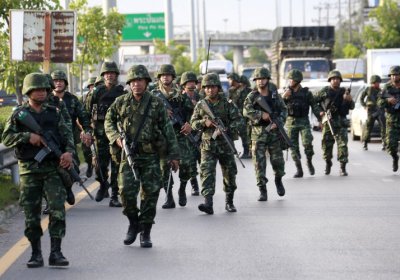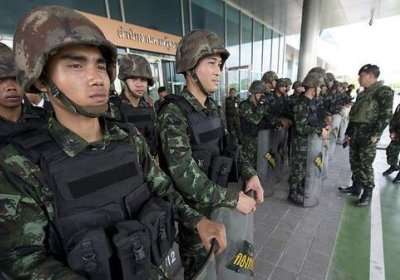After Thailand’s military overthrew the government and seized power in a coup on May 22, its new ultraconservative rulers wasted no time in rolling out the most radical and repressive right-wing reforms the country has seen since the height of the Cold War.
Army chief General Prayuth Chan-Ocha is now prime minister. The administration of the nation is being conducted out of an army base, and its people ruled by decree.
Thailand
The most striking thing about Thailand's coup d'etat is the speed and size of the anti-coup protests. Int he three days immediately after the coup, mass protests of ordinary people have erupted in many areas of Bangkok, but also in Chiangmai and other towns.
This is history in the making.
Representatives from the two sides of Thailand’s political conflict sat around a table on the afternoon of May 22 for the second day of negotiations hosted by the Royal Thai Army. The meeting took place under the military's self-declared martial law.
It was clear from the outset that no agreement between the pro- and anti-democracy forces would be reached. And so at about 3pm, the army chief General Prayuth Chan-Ocha, laid his cards on the table by bluntly presenting government representatives with one option ― resign.
The statement below was released by several Asian socialist groups on May 23 in opposition to the military coup in Thailand. To add the name of your group, email int.psm@gmail.com, cc international@socialist-alliance.org. You can see the updated list of signatories at here.
* * *
We, the undersigned organisations, strongly condemn the latest coup d’etat staged by the Thai military under the leadership of Prayuth Chan-ocha.
Thai army general Prayut Chanocha declared martial law on May 20 without consulting the caretaker government or any other elected representatives. Soldiers took over all radio and TV stations and are positioned along major road intersections in Bangkok.
Despite the fact that Prayut claimed that “this is not a coup”, his actions smell, taste and look like a coup. This is from a man who has blood on his hands.
A military coup is developing on May 20 in Thailand. The military has stepped in to declare martial law to “restore peace and order while denying it is a coup.
The country’s Constitutional Court had already dismissed the elected government of prime minister Yingluck Shinawatra on May 7. It came after months of violent right-wing protests including sabotage of elections aimed to resolve the country’s political crisis.
Thailand's unelected, anti-democratic and illegitimate Constitutional Court has staged a coup d'etat, overthrowing Prime Minister Yingluck Shinawatra on a mere technicality in a May 7 ruling. It claims the elected prime minister did not have the right to replace a government official.
Thailand's notorious Constitutional Court has once again worked hand in glove with the anti-democratic elite, ruling that the February 2 election was “unconstitutional”.
This is a re-run of the ruling that the 2006 elections were null and void. The 2006 ruling, along with anti-democrat protests, led to a military coup and the continuous destruction of Thai democracy.
Indiscriminate violence against ordinary people, whether they be involved in politics or not, is always appalling and serves no progressive or democratic purpose. The recent killing of children is even worse.
We have no idea who has been committing these latest deadly atrocities in Bangkok or in Trat and it would be foolish to make wild guesses. It could be those who favour a dictatorship and wish to create conditions favourable for a military coup against elected President Yingluck Shinawatra.
In the general elections held on February 2, 44.7 million people were eligible to vote. On the day, 20.4 million cast their vote.
Kasian Tejapira, a lecturer at Thammasat University, has estimated that there were about 12 million people who could not vote due to the right-wing thugs blocking polling stations and using violence to disrupt the election. This indicates there were about 32 million in total who wanted to vote. This compares to 35 million people who voted in 2011.
The national elections held on February 2 cannot solve the Thai political crisis because those lined up against the government and democratic elections are fundamentally opposed to democracy.
The election was marred by violence from right-wing Democrat Party thugs who were determined to prevent voting from taking place. Armed thugs fired automatic weapons into crowds of people seeking to vote. These thugs have been enjoying total impunity for more than a month while intimidating voters and candidates.
Many people may wonder why Yingluck Shinawatra's Pheu Thai Party’s government, which came to power supported by the poor-based Red Shirt mass movement, seems to be paralysed in the face of violent and criminal actions by Sutep Tuaksuban's Democrat Party mob.
It is not due to “invisible hands” from the throne or covert military support for Sutep. In fact, the top elites regard Sutep and his acolytes as lowly street gangsters.
- Previous page
- Page 4
- Next page






